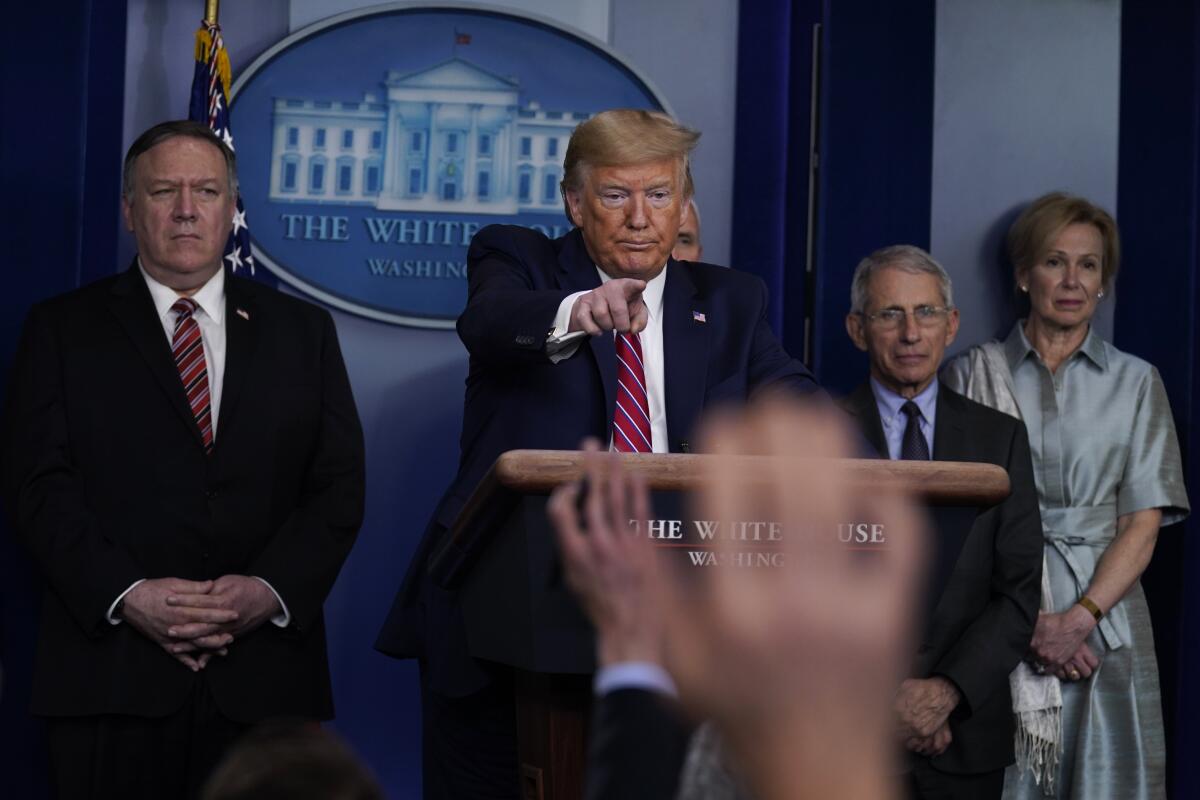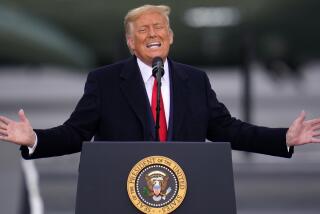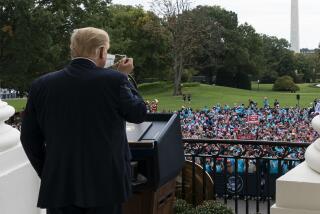Column: Trump’s strange coronavirus show

WASHINGTON — President Trump is finally taking the coronavirus contagion seriously.
Only a week ago, Trump told Americans the pandemic was nothing to worry about. “Relax,” he said. “We’re doing great.”
But after casualty projections soared and financial markets plummeted, he appeared to realize that the crisis will define his presidency and determine whether he wins a second term.
Unable to stage mass rallies, his favorite way to communicate to his base, Trump began holding daily televised briefings with a unifying theme: Your Wartime President in Action.
Unfortunately, much of what he says amounts to self-promotion and wishful thinking.
On Monday, he unveiled a new set of guidelines — “15 Days to Slow the Spread” — for minimizing social interaction.
On Tuesday, he urged Congress to pass a $1-trillion economic stimulus package.
On Wednesday, he ordered Navy hospital ships to New York and California and said he might invoke the Defense Production Act, a law that allows him to order companies to produce needed equipment.
On Thursday, he declared that the Food and Drug Administration had approved two anti-malaria drugs for use against the coronavirus. “It could be a game-changer,” he said.
On Friday, he said that he’s closing the U.S. border with Mexico to most traffic.
On Saturday, he said private industry has stepped up to produce surgical masks and ventilators, and blamed past administrations for any shortages that exist.
All that in addition to his earlier claim that Google was rolling out a website to direct anxious Americans to coronavirus testing sites in Walmart parking lots.
Alas, most of those pronouncements were what tech companies call “vaporware” — promises of products that don’t yet exist.
The corrections quickly piled up. The Google website (actually built by Verily, a Google cousin) is available only to residents of two Northern California counties. Congress is still wrangling over the stimulus; the check is not in the mail.
The hospital ships are being refitted and won’t sail for at least two weeks. Trump hasn’t used the Defense Production Act to order any equipment. The newly manufactured masks won’t be available for weeks.
And the FDA hasn’t approved any drugs for use against COVID-19, the disease caused by the coronavirus. It’s merely collecting data on an accelerated basis to see if they work.
If the president’s goal was to reassure Americans, his salesmanship didn’t do the trick.
The Standard & Poor’s 500 Index dropped more than 4% on Friday, closing out the worst week since the 2008 stock market crash. Wall Street has now erased all of the gains accumulated during the Trump administration.
That left the president to fall back on a familiar gambit: hectoring reporters over their coverage.
When a TV correspondent asked the president for his message to Americans who are scared, Trump snapped, “I say that you’re a terrible reporter.… It is a bad signal that you are putting out.”
For a conventional politician, that would have been a softball question. When it was posed to Vice President Mike Pence, he swung for the bleachers: “I would say, ‘Do not be afraid. Be vigilant.’”
Even odder, there was some good news in the briefings, delivered by less bombastic officials such as Pence and Dr. Anthony Fauci of the National Institutes of Health.
Despite plenty of problems, the pace of coronavirus testing is increasing. Pence said Saturday that more than 195,000 tests have been administered, a sharp increase from earlier estimates.
Trump rebuked governors for expecting his administration to provide lifesaving supplies, saying, “We are not a shipping clerk.” But the federal government has stepped up shipments of medical supplies, although many hospitals still face shortages of critical gear.
As Trump noted, some companies have begun to retool production lines to produce masks for medical workers and ventilators for patients, although it’s not clear how long that will take. Dozens of laboratories are searching for a therapeutic drug or a cure, although vaccines are at least a year away.
“We haven’t been given the credit that we deserve,” the president complained Friday. He may turn out to be right — but if so, he’s partly responsible.
He has over-promised and under-delivered — like a real estate promoter selling condos, not a leader steeling his people for difficult times ahead. A more sober description of the situation — one that acknowledges when things go awry — would be more convincing.
“Contemporary presidents are especially prone to mistaking spin for reality,” wrote Elaine Kamarck, a Brookings Institution scholar and former Bill Clinton aide. “When people are in trouble, even the most ardent government-haters ask that famous question, ‘Where is the government?’ And for most Americans, the president is the government.”
If the president and his aides can manage the crisis successfully — slowing the spread of the virus, getting medical equipment where it’s needed, easing the carnage to the economy — he’ll deserve the credit he seeks. Right now, he’s demanding praise for work he hasn’t done.
In the America of Trump’s briefings, everyone who needs a test can already get one. Every hospital can order surgical masks on the phone. A vaccine will be ready “in record time.” The economy will roar back “like a rocket ship.”
I hope he’s right. I hope all those good things come true. If they do, I’ll give him the credit he deserves.
Until then, I’m going to listen to Dr. Fauci and minimize contact with others. And so, I hope, will you.
More to Read
Get the L.A. Times Politics newsletter
Deeply reported insights into legislation, politics and policy from Sacramento, Washington and beyond. In your inbox three times per week.
You may occasionally receive promotional content from the Los Angeles Times.











